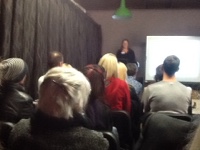We all do it. You buy a book and start reading it and then get distracted, sometimes by Life, sometimes by another book toy. And that has become a lot more frequent since the WWW made it possible to just download the thing RIGHT NOW instead of waiting till you get to a bookshop. That's especially true of me - and now I have no more room for paper books on my bulging shelves, I think, "Just this one more ebook..."
So my cyber bookshelves are crammed with books I've read from cover to cover and the unfinished gems just waiting for me to return. So this evening I've opened up some of these neglected treasures. I've read Robert E Howard's first sale to Weird Tales (he was only eighteen). A real eye opener about the pulp era! I'm a huge fan of this author, whose Conan stories and King Kull tales I adore, as I do Bran Mac Morn and Red Sonia and ... Well, he pretty much invented swords and sorcery! So when I say that if I got his first story, "Spear And Fang", in my ASIM slush, I would have rejected it, trust me - it's terrible! Probably I would have said no kindly, because it is so very obviously by a teenage boy, but rejected it anyway. It's so bad it's good.
Just as well he sent his first story to Weird Tales instead of ASIM, because he got better very quickly. In case you're interested, the anthology is called Shadow Kingdoms, volume 1 of a series featuring his early short fiction, in order of publication, but you can get some of his work free on Project Gutenberg; I have The Hour Of The Dragon, his only Conan novel from Gutenberg. I first read that in print as Conan The Conqueror, edited by Lin Carter. It's a nice vision of Conan in middle age, wincing as he finds there are some things he can't do quite as easily as he used to. He does some things well enough, though; there's a sweet young thing who fell in love with him at first sight as he rode his horse past her and now she is there to help him escape from the dungeon of the week. If you're a Conan fan, yes, it's Zenobia! If you aren't, yet, no further spoilers.
And ooh, I'd forgotten about another Gutenberg treasure, a collection of classic crime fiction by Rudyard Kipling, Wilkie Collins, even some Conan Doyle... Well, the Conan Doyle you can find easily enough elsewhere, but I'd never read the Kipling before, though it doesn't surprise me; he wrote a wide variety of stuff and I have some of his horror fiction both in print and ebook. It's great stuff. This collection is under The Lock And Key Library.
And oh, I have too long neglected some of the short fiction of the likes of Murray Leinster and Henry Kuttner, which came with the original covers of the SF magazines in which they appeared! I found those in Gutenberg too. Amazing how much of the early fiction of big name SF writers you can find in Gutenberg!
Well, I'd better get back and finish reading these gems...
So my cyber bookshelves are crammed with books I've read from cover to cover and the unfinished gems just waiting for me to return. So this evening I've opened up some of these neglected treasures. I've read Robert E Howard's first sale to Weird Tales (he was only eighteen). A real eye opener about the pulp era! I'm a huge fan of this author, whose Conan stories and King Kull tales I adore, as I do Bran Mac Morn and Red Sonia and ... Well, he pretty much invented swords and sorcery! So when I say that if I got his first story, "Spear And Fang", in my ASIM slush, I would have rejected it, trust me - it's terrible! Probably I would have said no kindly, because it is so very obviously by a teenage boy, but rejected it anyway. It's so bad it's good.
Just as well he sent his first story to Weird Tales instead of ASIM, because he got better very quickly. In case you're interested, the anthology is called Shadow Kingdoms, volume 1 of a series featuring his early short fiction, in order of publication, but you can get some of his work free on Project Gutenberg; I have The Hour Of The Dragon, his only Conan novel from Gutenberg. I first read that in print as Conan The Conqueror, edited by Lin Carter. It's a nice vision of Conan in middle age, wincing as he finds there are some things he can't do quite as easily as he used to. He does some things well enough, though; there's a sweet young thing who fell in love with him at first sight as he rode his horse past her and now she is there to help him escape from the dungeon of the week. If you're a Conan fan, yes, it's Zenobia! If you aren't, yet, no further spoilers.
And ooh, I'd forgotten about another Gutenberg treasure, a collection of classic crime fiction by Rudyard Kipling, Wilkie Collins, even some Conan Doyle... Well, the Conan Doyle you can find easily enough elsewhere, but I'd never read the Kipling before, though it doesn't surprise me; he wrote a wide variety of stuff and I have some of his horror fiction both in print and ebook. It's great stuff. This collection is under The Lock And Key Library.
And oh, I have too long neglected some of the short fiction of the likes of Murray Leinster and Henry Kuttner, which came with the original covers of the SF magazines in which they appeared! I found those in Gutenberg too. Amazing how much of the early fiction of big name SF writers you can find in Gutenberg!
Well, I'd better get back and finish reading these gems...












